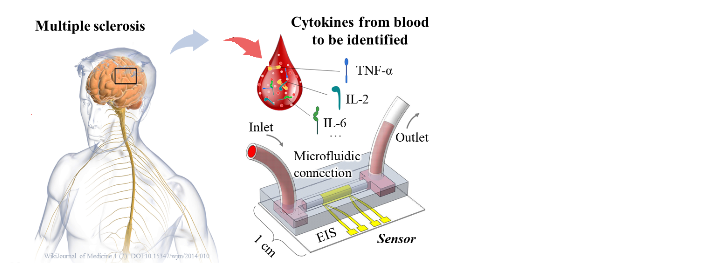
Miniature proteometric sensor for label free cytokine identification and quantification |
Medical Need
Multiple sclerosis (MS) is one of the most commonly spread neurological diseases which affects over 2.5 million people worldwide mostly of working age resulting in a 7-year shorter life expectancy. Diagnosis of MS is very challenging due to the lack of specific tests. Moreover, the full clinical investigation requires experienced personnel and expensive medical equipment which restricts fast, affordable and regular screening of patients worldwide and become especially crucial in remote regions where access to regular clinical facilities is limited. Therefore, novel diagnostic analytical platforms are desired for rapid non-invasive detection of MS biomarkers to be easily accessible on a regular screening base.
In this project we intend to mature ultra-compact and sensitive microfluidic EIS sensors prepared at wafer-scale with shapeable materials and self-assembly technologies. The proposed sensor will be suitable for both, the functionalization and the label-free detection of small volume samples.
Multiple sclerosis, Diagnostics, Biomarker monitoring, Point-of-care, Microfluidic Sensor
Aleksandr I Egunov , Zehua Dou, Dmitriy D Karnaushenko, Franziska Hebenstreit, Nicole Kretschmann, Katja Akgün, Tjalf Ziemssen, Daniil Karnaushenko, Mariana Medina-Sánchez, Oliver G Schmidt. Impedimetric Microfluidic Sensor-in-a-Tube for Label-Free Immune Cell Analysis. Small 2021 Jan 15;e2002549.
Abstract |
In the frame of the project, we are going to mature sensors-in-a-tube technology to bring label-free proteometric identification and quantification methods closer to clinical applications. The current project relates to the analysis of multiple sclerosis (MS) promoted inflammatory biomarkers, namely a set of cytokines. Application of existing electrical impedance spectroscopy detection technologies in clinical practice is very limited. In MS several molecular biomarkers are present in blood and cerebrospinal fluid simultaneously as part of a specific immunological signature. Existing sensors are generally based on planar electrodes in relatively large channels leading to severe losses in sensitivity since the screening (Debye) length is short (nm range) and only a small part of the channel is exposed to the electric field. In the present project, we intend to design a novel parallel-plate capacitive sensor which allows to depose electrodes in a distance compared to Debye length on the whole working surface resulting in increased sensitivity.
The miniature detector will be fabricated using self-assembled microtubular architectures that will be equipped with microelectrode arrays and encapsulated into a microfluidic chip. The proposed sensor is designed to be compact, low cost, highly sensitive and user friendly. The sensor will be used to acquire electrochemical impedance spectra and differential pulse voltammetry signals relying on the integrated microelectrodes. Within the project we will improve signal analysis to distinguish various cytokines in model solutions, enriched and non-threated human serum. We intend to build a small-scale portable demonstrator for direct application in the clinic.

